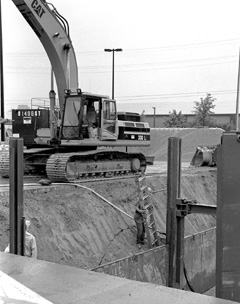By Diane Brown
Facilities and Operations

“Sustainability” and “alternative products” are former buzzwords that are becoming part of our common vocabulary. At the University, they are growing into our operational processes as well. One visible indication of this transformation is the new ethanol fuel tank that was installed in May at the Kipke Drive fueling station. With a capacity of 10,000 gallons, the tank will help service the 100 special vehicles the University purchased this year.
“The new fleet vehicles are called flexi-fuel vehicles,” explains Patrick Cunningham, director of Parking and Transportation Services. “They run on either ethanol or gasoline. We’ll require the vehicle owners to use ethanol fuel around campus, but they have the flexibility to also use unleaded gasoline when traveling away from campus where ethanol is harder to find. The vehicles are equipped with computers that regulate the fuel during combustion, so the driver doesn’t have to do anything to change the car when filling the fuel tank.”
The ethanol fuel that U-M will utilize is called E85, which is 85 percent ethanol fuel and 15 percent unleaded gasoline. Ethanol fuel is made from agricultural products, mostly corn, and is one of the safest alternative fuels to operate, Cunningham says.
“Not only will using the ethanol fuel help our environment with less pollution, but it also will decrease our dependence on foreign oil,” Cunningham adds. “The E85 is also just 20 cents a gallon more than mid-grade unleaded gasoline, so this is one case where alternative products aren’t cost prohibitive.
“We’ll be one of the largest fleets of ethanol users in the state of Michigan when the new vehicles come on board,” Cunningham notes. The new vehicles include Ford sedans and station wagons, Chrysler mini-vans and General Motors small trucks.
The ethanol fuel tank was installed by Clarkston-based Oscar W. Larson.

